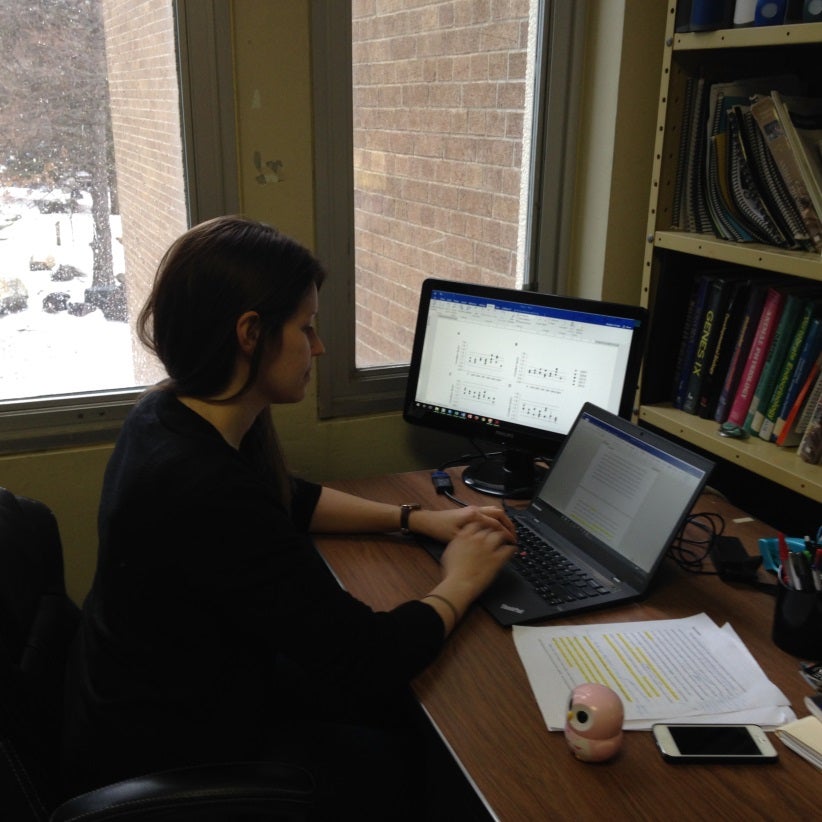I knock on a door and am greeted by Meghan Fuzzen, a PhD candidate in biology whose research focuses on determining the impact of treated wastewater on the reproductive health of fish in the Grand River.
When I walk into the office she shares with several other biology graduate students, I notice colourful kitchen timers of all shapes – chickens, pears, cupcakes, owls – on nearly every desk. The timers are evidence of Fuzzen’s positive influence on her colleagues. As one of 15 participants in the Writing Centre’s first Dissertation Boot Camp in December 2015, a four-day program designed to help dissertation and thesis writers get a jump start on meeting their writing goals, Fuzzen learned several strategies for productive writing, one of which involves using a kitchen timer to track short intervals of focused work.

2015 Dissertation Boot Camp participant Meghan Fuzzen writes in her office, accompanied by her Pomodoro timer.
Fuzzen’s supervisor, Prof. Mark Servos, who is Canada Research Chair in Water Quality Protection, pops by to tell me about the workshop that Meghan facilitated to share the skills and strategies that she learned during Dissertation Boot Camp with her colleagues. “Meghan managed to infect everybody else,” he tells me of the approach to writing her office mates are now also using.
One of these strategies is the Pomodoro Technique, which was developed by Francesco Cirillo, and was inspired by a tomato-shaped timer in his own kitchen (“Pomodoro” is Italian for “tomato”). Users of this method set a specific, concrete goal, set a timer, and then work towards that goal for 25 minutes at a time. They take short, five minute breaks in between each “Pomodoro” and record their progress throughout the day. Servos and his students have taken to referring to these writing units as “Pearodoros” because of the pear-shaped kitchen timers that adorn a few of the office desks.
One of Fuzzen’s office-mates, master’s student Katie McMann, says that this technique is useful for her because it helps to sustain motivation. “I both read and write pretty slowly,” she tells me, “so going strictly by word count is super demoralising. Having this means that even if I didn’t get a lot of words I still worked for that one or two hour period and I achieved something, and it gives you a different type of goal that can actually help you be motivated over time.” She explains that “My goal today isn’t to write a lot of words, it’s to get four pre-defined periods of time of just work done, and that’s way more achievable.” One of Fuzzen’s other office-mates, PhD student Maricor Arlos, appreciates that the technique not only “encouraged discipline” within the office (as Fuzzen points out, “I started a system of if someone has a timer running you don’t interrupt them”), but also highlights the importance of time away from the screen: “I like the fact that the technique itself is very helpful for breaks, too,” she says, “and that’s something that I just didn’t think of doing.”

Biology graduate students (L-R) Maricor Arlos, Meghan Fuzzen, Keegan Hicks and Katie McMann show off their Pomodoro timers.
This strategy has helped Servos’ students to become more accountable, set small, concrete goals as they work on large writing projects, and to make – and keep – commitments about when they will submit completed work to him. “It helps me help them,” he says of the renewed discipline Fuzzen has inspired in her office-mates. “I’m going to try to get my future PhD students to start getting to do this kind of stuff right away.”
Fuzzen tells me that participating in Dissertation Boot Camp “took away some of the stress and anxiety” that she was feeling about writing: “I guess for a lot of us it was having a good environment and a supportive environment to work in. I think that’s what I found most helpful.” She say that the workshop on goal setting that she participated in during Boot Camp “has been really helpful, and learning how to set small, achievable goals has really changed how I set out my work day. Instead of just having an idea of what I want to work on I’ll have a list of smaller things so that I can actually cross them off the list.”
“I do find myself sliding every once in a while,” Fuzzen admits of her work habits, “and I notice that’s when I find myself feeling anxious or stressed again and then I know I need to just go back and re-start making lists and using the timer. Because I don’t always use the Pomodoros, but I find when I’m overwhelmed breaking it down into 25-minute blocks really helps me to get back into a good space.”
This April, 40-45 new graduate students will have benefit from the same strategies Fuzzen has learned – and shared with her colleagues – and have the opportunity to write intensively for four days in a supportive community. Dissertation Boot Camp runs Monday, April 18 to Thursday, April 21 from 9am-4pm. Participants will take part in short, skill-building workshops and write between 4 and 6 hours each day. Applicants for this intensive program, both master’s and doctoral students, should already be in the writing stage or ready to begin writing. Participants will be selected based on their applications.
For more information about Dissertation Boot Camp, check out the Writing Centre's website, this Daily Bulletin article, or contact Clare Bermingham, Writing Centre Manager at cbermingham@uwaterloo.ca.